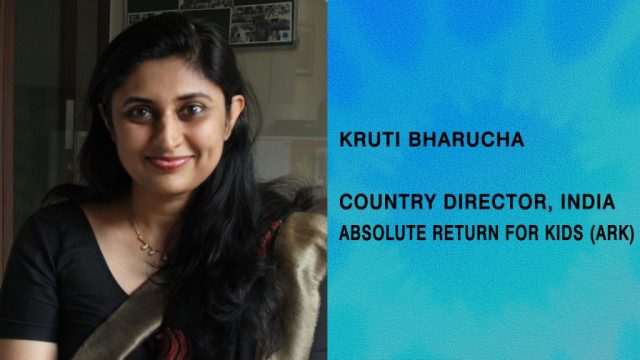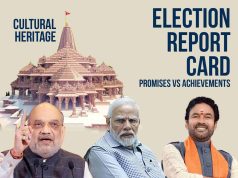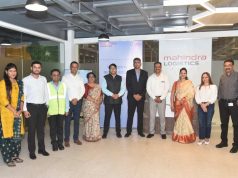India’s Regional & Linguistic Diversity Creates Unique Challenges For Education System: Kruti Bharucha, Director, ARK
Absolute Return for Kids (Ark) is a non-profit organisation that works globally towards improving the learning outcomes of public education systems. Kruti Bharucha, Country Director, Ark in her 16-year long career has worked with McKinsey & Co., The World Bank and the International Monetary Fund. In an interview with The CSR Journal, Bharucha talks about the vision behind their work and the different challenges existing in India.
Tell us about Ark and its focus areas?
Ark is a non-profit organisation that seeks to transform children’s lives through education. Founded in 2002, we have worked alongside governments and NGO’s in the UK, India, Africa and Eastern Europe to run child protection, health and education programmes, with a particular focus on supporting schools in disadvantaged communities. Over the last ten years, Ark has grown into a network of 41 schools in the UK working in a Public-Private Partnership (PPP) with the Department of Education – and is now recognized as one of the highest achieving school networks in the UK, particularly in raising attainment for the most disadvantaged children.
In India, where we established our presence six years ago, we have a record of working effectively with government agencies and other non-profit partners to deliver high impact education programmes.
What are the different activities undertaken by Ark in India?
In India, we are focused on two pillars (1) the creation of exemplar schools that will raise the expectations of the school system and revitalize the government school system (2) enable and advise on large-scale programmes that are anchored on quality and accountability.
On the first pillar, we launched the first Ark school last July in partnership with the South Delhi Municipal Corporation. Currently, we are looking at expanding our network as well as working with the Delhi government on issues of broader educational reforms. On the second, we have been involved with a school quality improvement programme in Madhya Pradesh – this started as a pilot in 100 schools, expanded to 2,000 and is now completely owned by the government and being rolled out across 25,000 schools in the state. The programme has now also been rolled out in Delhi.
What do you think are the challenges public education system is currently facing in India?
In recent years, India has made great progress in reaching universal primary education. But the quality has not kept pace with increase in access to education. While many private schools provide good education to children from privileged families; examples of schools delivering an excellent education to children from deprived communities are very rare. Although government schools do cater to children from poorer households, over the years the quality of education delivered in such schools has reduced significantly and reports show that children are not achieving class-appropriate levels. According to a recent survey done in Delhi government schools, 75% of students leaving grade 5 could not read a grade 2 level English story, and 13% could not even identify the alphabet. The poorest children are disproportionately affected by this low quality of education.
How different are the challenges in India compared to your global practice?
Some of the key challenges of the Indian education system are:
1) Lack of accountability – Lack of capacity and capability within existing administrative structures to efficiently monitor and support teachers and schools. The system lacks proper accountability measures and discourages creativity within the classroom.
2) Diversity – India’s regional and linguistic diversity creates unique challenges for the education system. The country’s 22 official languages and hundreds of spoken dialects often differ considerably and our schools are not equipped to manage these different comprehension levels.
3) Scale – Public education systems across the world are riddled with inefficiency and limited resources but these problems are magnified in India because of the sheer scale – our population size is too large and makes quality control and monitoring difficult.
Ark works to improve public education systems globally. How do you think the public education quality gap can be improved to be in-par with that of private education?
Improving education quality in public schools requires attention to many things, including increasing teacher accountability, better assessments and efficient monitoring and support systems for schools.
The government is increasingly seeing partnership schools as one way to improve the performance of failing public schools and address these challenges. Evidence from PPP schools in UK and USA has proven that privately-managed government schools have the potential to improve learning outcomes, especially for the very poorest children. By allowing schools greater autonomy, without sacrificing government oversight, PPPs have the potential to transform existing government schools into centres for excellent learning.
What is your opinion on education based CSR activities of corporate house?
A strong education system is the cornerstone of any country’s growth and prosperity. The corporate sector can play an important role in the resolution of many issues within the education system, especially by funding and supporting non-profits. Corporate CSR should focus on funding credible non-profits with the potential to bring systemic change within the education system. Such support should typically be provided for a 3-5 year period. This will enable non-profits to show results, deepen their model as well as pilot and experiment to find sustainable solutions to education problems.
Thank you for reading the interview until the very end. We appreciate the time you have given us. In addition, your thoughts and inputs will genuinely make a difference to us. Please do drop in a line and help us do better.
Regards,
The CSR Journal Team













